Acne scars are a common dermatological issue that can affect anyone after inflamed acne heals, leaving behind dark spots on the skin. To achieve effective acne scar treatment, it is essential to understand the underlying causes and apply suitable skincare methods. HBIO Clinic will help you explore in detail what acne scars are and share 8 effective ways to treat acne scars, helping you restore smooth, radiant, and even-toned skin.
What Are Acne Scars? Classification of Acne Scars
Acne scars refer to dark marks that appear after acne, inflammatory acne, or hormonal acne heals. These areas appear darker than the surrounding skin due to post-inflammatory hyperpigmentation, where the skin produces excess melanin to repair damage.
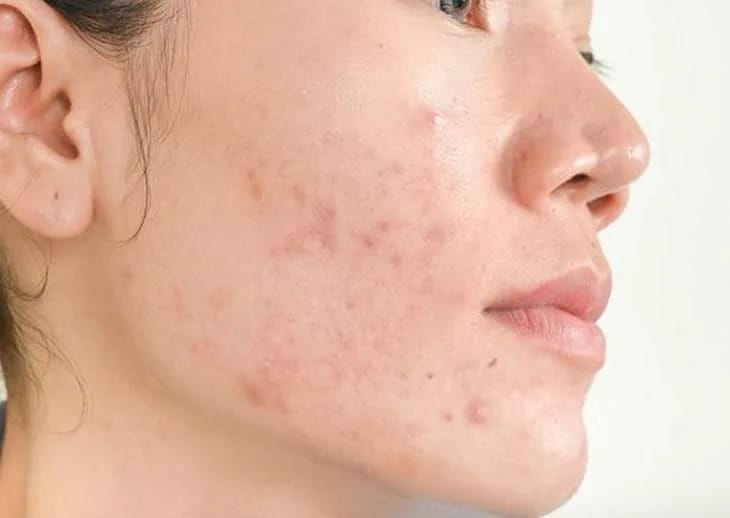
Though acne scars do not pose health risks, they affect one’s appearance, making the skin look dull and lifeless. Without proper treatment, the condition can persist, harden the skin surface, impair absorption of skincare products, and accelerate aging.
Based on appearance and color, acne scars are classified into two main types of acne scars:
-
Red acne marks: Caused by broken capillaries under the skin, leading to red or pink patches. Often seen in sensitive or thin skin. If not properly cared for, redness may linger.
-
Brown/dark acne marks: Result from melanin overproduction during skin recovery, common in darker skin tones and slower to fade.
Read now: Types of Melasma and Effective Treatment Options
What Causes Acne Scars?
Identifying the cause is key to choosing the right solution and speeding up skin recovery. Common causes of post-acne marks include:
-
Inflammation from acne: Pustules, cystic acne, and nodules cause deep damage, stimulating melanin production and resulting in dark acne marks.
-
Improper pimple extraction: Using unclean hands or tools can worsen inflammation, allowing bacteria to spread and leading to deeper scars.
-
UV exposure: Sunlight triggers melanin production, darkening the scars further without proper sunscreen protection.
-
Incorrect skincare routine: Poor cleansing, unsuitable products, or overuse of irritants slow down skin recovery and worsen discoloration.
-
Lack of hydration and nutrients: Insufficient water or vitamins like C, E, and zinc hinders regeneration, delaying the fading of scars.
-
Hormonal imbalance: Stress, puberty, or pregnancy can extend the inflammation phase, making acne scars more prominent and harder to heal.
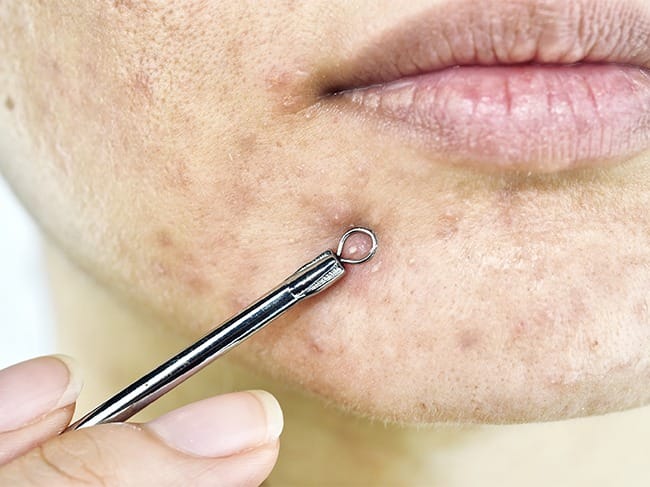
Read now: Safe and Effective Acne Vulgaris Treatment at HBIO Clinic
8 Effective Ways to Treat Acne Scars
1. Laser Acne Scar Treatment at HBIO Clinic
Laser therapy at HBIO Clinic is a modern, effective solution to break down melanin clusters and fade dark spots. It also stimulates collagen production, improving skin tone and texture. The procedure is performed by experienced dermatologists, ensuring safety and optimal results. If you’re seeking a reliable acne scar treatment, laser is a highly recommended choice.
2. Treat Post-Acne Marks with Natural Ingredients
Natural ingredients offer gentle and safe options for all skin types. Turmeric, lemon, honey, aloe vera, and coconut oil help lighten scars and nourish the skin:
-
Turmeric: Rich in curcumin, reduces inflammation, regenerates cells, and fades scars.
-
Lemon: High in vitamin C and citric acid, exfoliates and brightens. Always dilute or mix with honey and apply sunscreen.
-
Honey: Moisturizes, soothes, and supports healing. Use alone or with turmeric/lemon for better results.
-
Aloe vera: Calms redness, boosts collagen, and evens skin tone.
-
Coconut oil: Contains vitamin E and fatty acids to soften and repair skin.
3. How to Treat Acne Scars with AHA/BHA
AHA (e.g., glycolic acid, phytic acid) and BHA (e.g., salicylic acid) are chemical exfoliants that slough off dead skin and stimulate cell renewal. Regular use helps improve pigmentation and clear clogged pores, accelerating scar fading and smoothing the skin.
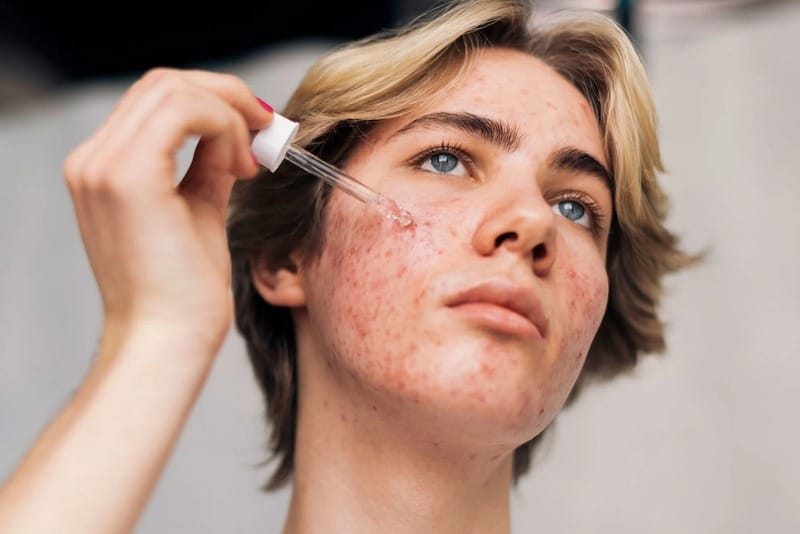
Read now: TOP 10 Common Causes of Acne You Should Know
4. Vitamin C Serum for Acne Scar Treatment
Vitamin C is a top ingredient for acne scar treatment, known for its anti-inflammatory properties and ability to reduce melanin formation. When used at the right concentration, it fades dark marks and prevents new ones from forming.
5. Niacinamide to Brighten and Treat Acne Scars
Niacinamide (Vitamin B3) regulates sebum, maintains skin barrier function, and stimulates collagen production. It improves skin firmness, fades acne scars, and promotes even skin tone.
6. Use of Retinol or Tretinoin for Acne Scar Treatment
Both are Vitamin A derivatives that enhance cell turnover. Retinol is milder and improves texture with minimal irritation. Tretinoin is more potent, boosts collagen, and accelerates exfoliation. Use with moisturizer and sunscreen to avoid irritation.
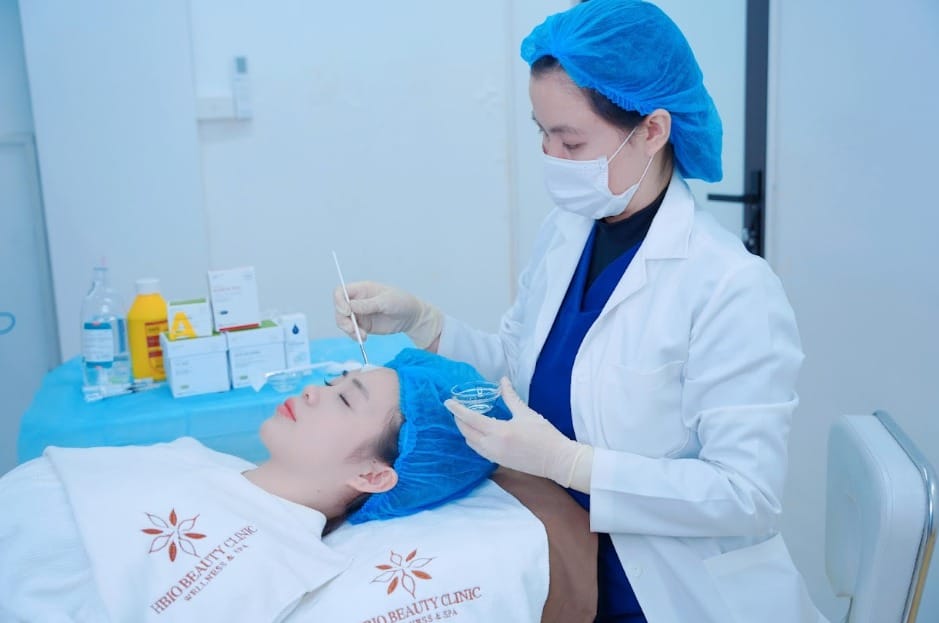
However, when using these active ingredients, it is necessary to combine adequate moisturizing and sun protection to avoid irritation and best protect the skin.
7. Chemical Peeling Method
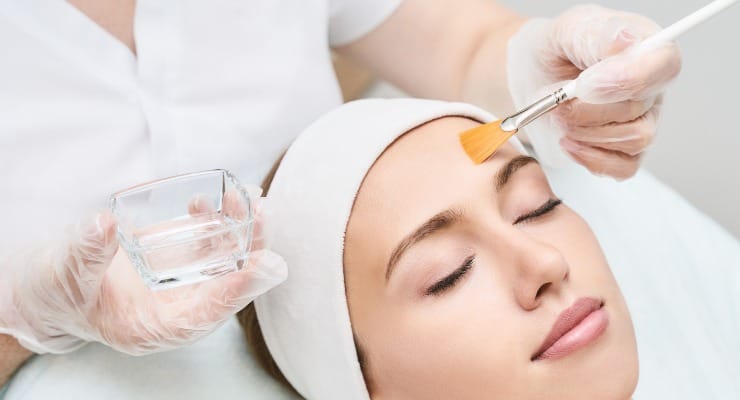


 Tiếng Việt
Tiếng Việt
Dr. Thai Nguyen – Founder and Medical Director of HBIO Clinic. As an expert in aesthetic dermatology, she regularly shares in-depth knowledge and practical experience to provide valuable and insightful information for those seeking better skin health.